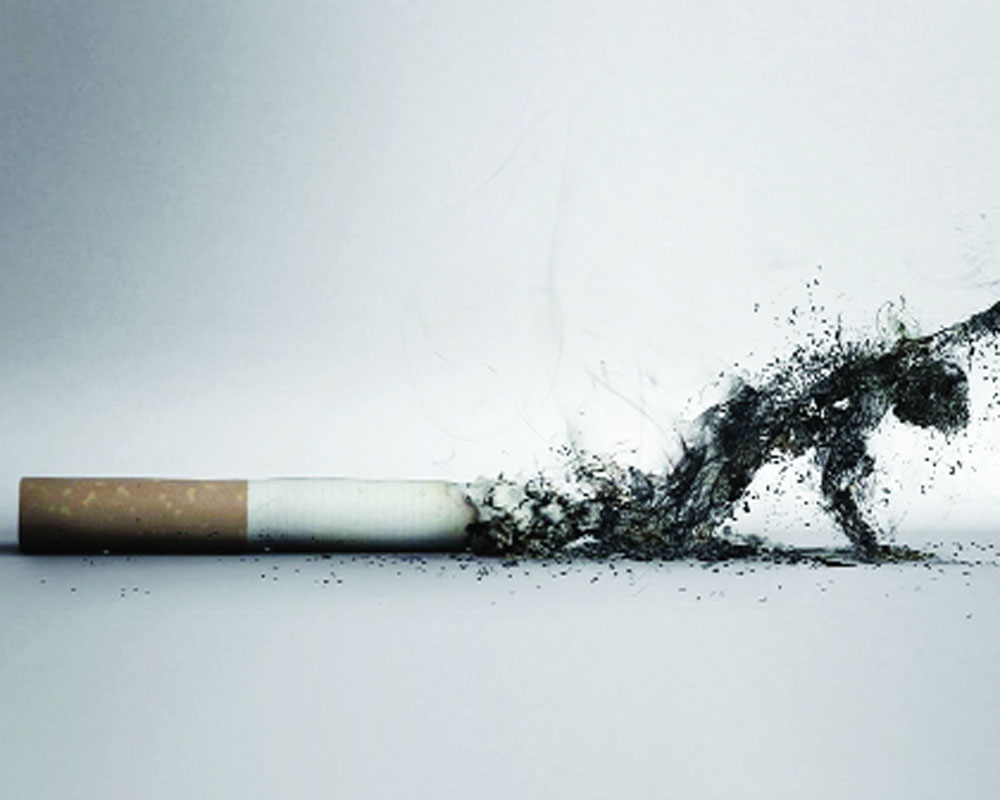Dr Vikas Maurya suggests that there is a need for counselling and pharmacotherapy centres to eliminate addictive smoking
Tobacco use, particularly smoking, is widely recognised by the medical community as well as the general public as a major public health hazard. Despite the fact, unfortunately smoking has always received social acceptance across the world. It is the single most important preventable risk to human health and an important cause of premature deaths. Globally it kills nearly six million people, of which 0.6 million is due to passive smoking. By 2030, with current trend, more than eight million people will be killed every year worldwide. Nearly 80 per cent of deaths will be in underdeveloped countries. In India, smoking is one of the major cause of deaths and diseases, accounting for millions of such cases daily.
Guidelines for tobacco have been published by the Ministry of Health. This should be known to all physicians in order to help the patients to stop smoking which will further help in prevention of disease or its progression.
Cigarettes contain about 600 ingredients. Smoking generates more than 7,000 chemicals. Many of these are poisonous and almost 69 of them can cause cancer.
Many of the elements are found in cigars and hookah pipes. Cigars have a higher level of carcinogens, toxins, and tar as compared to cigarettes. While smoking hookah, one is likely to inhale more smoke than a cigarette. It has many toxic compounds and even exposes to more toxic carbon monoxide (CO) gas than cigarettes. Hookahs produce more passive smoke. In India bidi consumption is seven to eight times more common than conventional cigarettes and when compared them, ‘bidis produce equal or higher levels of nicotine, tar and other toxic chemicals.’
After inhalation, these compounds not only reach lungs but are absorbed and can damage almost every single organ of the body.
Smoking harms the overall health, increases absenteeism from work and also extends health care utilisation. It is a burden on the country’s economic costs.
Apart from lung (deadliest), oropharynx, larynx (voice box) and windpipe cancer it can also cause cancer almost anywhere in our body. This includes — in bladder, food pipe, stomach, large intestine, cervix, kidney, liver, pancreas and blood. Among asthmatics, smoking is considered as one of the major risk factor for acute attacks and thereby increasing morbidity and mortality. Other respiratory diseases whose incidence or severity is increased by smoking are common cold, influenza, pneumonia, lung fibrosis, lung hemorrhages and spontaneous development of air leak from the lung leading to lung collapse.
Smoking not only contributes to mortality from pulmonary diseases, which includes deaths from lung cancer, and chronic obstructive pulmonary disease but it also contributes to cardiovascular diseases like heart attack and stroke. It increases the risk of type-2-diabetes and can make sugar control difficult if not stopped. If a diabetic person smokes, they have a higher risk of serious complications including heart and kidney diseases, eye problems, neuropathy and vascular complications.
Smoking affects nearly every organ and harms a person’s overall health. It even makes difficult for a woman to conceive and can cause premature deliveries, still births, sudden infant death syndrome, and ectopic pregnancy if they conceive. In men, it worsens the sperm count, which can reduce the fertility rate and can increase the risk of birth defects and miscarriages. In women, during childbearing age it can result in bone weakness and increases the risk of fractures. Smoking can also affect tooth and gums and can result in tooth loss. It is also a cause of rheumatoid arthritis, which is a crippling joint disorder.
Risk from tobacco smoke is not limited to the person who smokes alone but also to those around the smoker. This is called second-hand smoke or passive smoking. The risk of lung cancer increases by 30 per cent due to passive smoking and this also contributes to work absenteeism in non-smoking adults because of respiratory illnesses.
Smoking which is a harmful socio-economic factor, is a contributor to morbidity and mortality of tuberculosis. In 2002, in first such review article published in the International Journal of Tuberculosis and Lung Diseases, it was concluded that smoking could be considered as an important risk factor for the development of tuberculosis. Not only active but also passive smoking was found to be associated with increased risk of tuberculosis. As we know that in our country tuberculosis is widely prevalent, smoking can increase the risk by many folds.
Quitting smoking lowers the risk of many diseases and can add years to our life. It not only reduces the risk of heart attacks but also the risk of stroke, cancers and other disorders. Quit smoking clinics, where smokers are helped in quitting the habit by proper counseling and recommended pharmacotherapy are the need of the hour. There are a few centres in our country but that too are restricted to some medical colleges and hospitals but the requirement of such centres are in massive numbers.
There is a need of increase and much stringent government regulation on smoking. The addiction which is connected and gives only diseases and also increases countries’ medical costs is rampant at the moment. The cigarette company’s argument that they bring revenues to the country is nothing else but a sheer myth being propagated as the costs involved in treating the diseases caused by smoking is enormous and runs in billions of rupees. Secondly the loss of humanity is priceless and irreversible.
(The author is the director and head, department of pulmonology and sleep disorders, Fortis Hospital.)


























